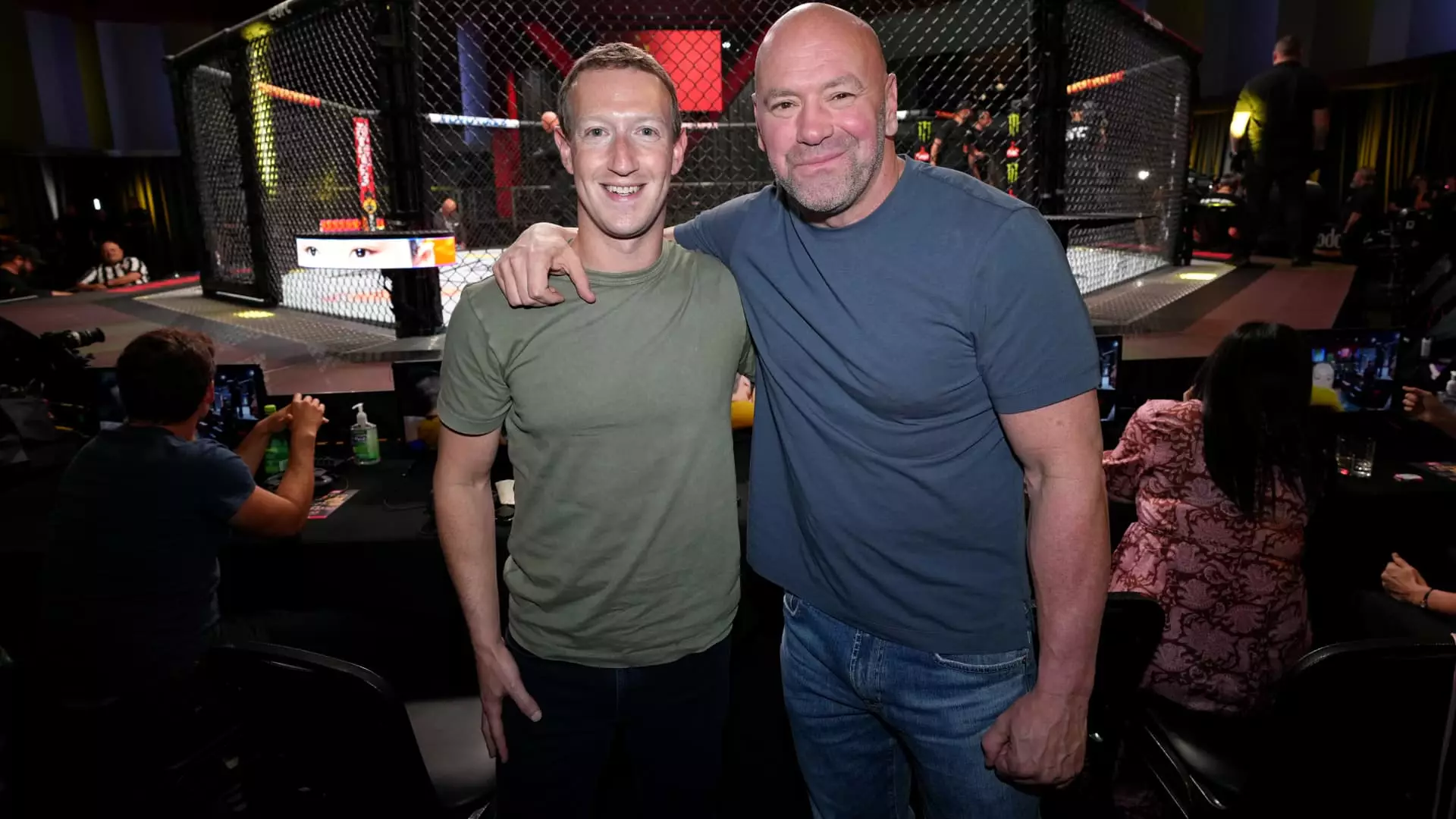In a notable development in the corporate world, Dana White, the esteemed CEO of the Ultimate Fighting Championship (UFC), is stepping onto the board of Meta, the parent company of Facebook. This announcement comes just a fortnight before the inauguration of President-elect Donald Trump, with whom White shares a long-standing friendship. This move signifies a strategic alliance that intertwines the realms of sports, entertainment, and the tech industry, through Meta’s operational leadership. Mark Zuckerberg, CEO of Meta, recognized White’s contributions, claiming he has transformed the UFC into a global powerhouse in sports, both in terms of value and popularity.
What makes this appointment particularly intriguing is the juxtaposition of White’s rugged persona in the fight industry with Zuckerberg’s stature in the tech sector. Zuckerberg, who has cultivated an interest in mixed martial arts and even trained in it, showcases how personal passions can overlap with professional strategies. It’s a relationship that’s surely built on shared interests but is also encased in the complexities of past political friction and contemporary business dynamics.
Zuckerberg’s journey as a martial arts enthusiast has not been without its physical toll, illustrated by his recent injury during training for an MMA fight—an accident that adds an element of authenticity to his engagement with the sport. His public dialogues with high-profile figures, such as Elon Musk, reflect a kind of performance art where business motives and personal rivalries intersect. After a series of lighthearted jabs exchanged between the two tech magnates, a potential fight was poised but ultimately fizzled out, reinforcing the notion that the boardroom and the ring may not converge as seamlessly as some might wish.
The MMA scene has become a significant cultural touchstone in recent years, serving as a backdrop for not just sport but also the unfolding narratives of celebrity and personal brand-building, as evidenced by Zuckerberg’s decision to engage in the sport actively. This portrayal very much aligns with the ethos of Meta, which is navigating the complexities of the social media landscape while pushing the envelope on virtual experiences and community dynamics.
Against the backdrop of White’s appointment, the political intricacies become increasingly apparent. White’s presence on stage with Trump on election night is emblematic of a relationship that transcends business and ventures into the realm of personal loyalty. His comments about Trump, highlighting resilience and hard work, resonate strongly in a charged political atmosphere. Furthermore, Meta’s monetary contribution to Trump’s inaugural fund emphasizes how intertwined political affiliations can affect corporate strategies, signaling to shareholders and the public the potential for influence that such connections may yield.
These alliances are fraught with risk, particularly as controversies have marred the reputations of the individuals involved. White himself faced backlash after a widely publicized incident in which he was captured on film behaving violently towards his wife. His subsequent apology and her defense frame this controversy as an isolated episode, yet it raises questions about accountability and public perception, especially within an organization such as Meta, which operates under intense scrutiny from various stakeholders.
Zuckerberg is keen to outline future-oriented trajectories for Meta as he assembles a diverse board, which now includes notable figures like John Elkann and Charlie Songhurst, each with distinct backgrounds in automotive and corporate strategy. The drive toward innovation in artificial intelligence and wearables will undoubtedly benefit from this eclectic pool of expertise. Zuckerberg’s assertion of “massive opportunities ahead” for Meta aligns with contemporary trends pointing towards a blending of technological advancements with everyday social interactions.
The potential for Dana White’s influence within this new framework remains to be seen. His experiences in building the UFC, along with a keen understanding of media and branding, could prove invaluable as Meta navigates its own challenges and opportunities. However, mindful of the controversies surrounding both White and the board itself, critical observers will be watching closely to see whether this convergence of combat sports and technological innovation can yield sustainable benefits or simply add more layers to an already complex narrative of power dynamics in contemporary America.
Dana White’s appointment to Meta’s board encapsulates a fascinating confluence of sports, technology, and socio-political intertwined narratives. While the opportunities for innovation are abundant, the implications of existing controversies and relationships cannot be overlooked. As the board moves forward, balancing ambition with accountability and public perception will be crucial in navigating the tumultuous waters of contemporary corporate governance.

